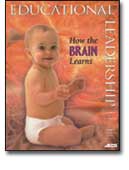Ten Things Every Child Needs
Ten Things Every Child Needs. Robert R. McCormick Tribune Foundation.
Recent brain research has shown that intelligence and personality are directly linked to brain development. During childhood, especially early childhood, the brain is most flexible and responsive to experience. Without experience, children's neural development suffers and even stagnates. Hosted by actor Tim Reid, Ten Things Every Child Needs is a video that explains how early interactions with children affect their brain development.
Leaders in brain development and child research, such as T. Berry Brazelton, Bruce Perry, and Barbara Bowman, explain new research findings regarding brain growth and discuss their implications for early childhood care and education. Together, they explain how interaction, touch, stable relationships, safe and healthy environments, self-esteem, quality child care, communication, play, music, and reading positively affect a child's social, emotional, and intellectual development.
Available from the McCormick Tribune Foundation, 435 N. Michigan Ave., Ste. 770, Chicago, IL 60611, Attention: 10 Things. $12, including shipping and handling.
The Co/Motion Guide to Youth-Led Social Change
The Co/Motion Guide to Youth-Led Social Change. Alliance for Justice.
Co/Motion, a program of the Alliance for Justice, believes in empowering young people to become agents of change in their communities. This 250-page training manual gives young people tools, skills, and strategies to work for social change.
The Co/Motion Guide is both practical and thought provoking, with a slick, attractive design that makes it immediately accessible. The 13 chapters build on one another, beginning with an overview of social change and moving into more practical techniques for putting ideas into action: organizing, networking, campaigning, writing, and communicating with the media.
Each chapter contains concrete examples, questions and answers, tips, checklists, and profiles of sample issues so that students can see how different strategies translate into real-life situations. The guide could be a useful tool for teachers in a classroom setting and for parents who want to work with their children on social engagement. At a time when polls show that students are less and less interested in activism and politics, this is a fun and engaging way for students to become involved in the world around them.
Available from the Alliance for Justice, 2000 P St. NW, Ste. 712, Washington, DC 20036; (202) 822-6070; fax (202) 822-6068 (e-mail: comotion@afj.org).
After-School Care in Brief
After-School Care in Brief. National Assembly of National Voluntary Health and Social Welfare Organizations.
The latest brain research underscores the need for students of all ages to have access to appropriate, stimulating after-school care. This policy report, released by the National Collaboration for Youth, contains several recent Congressional briefings on school-age care. Testimonies from the experts argue that communities need to develop plans to integrate existing programs and to ensure that after-school care facilities are well staffed, enriching, and accessible to all.
Although some may view after-school programs as simply a form of babysitting, the briefing book proposes that quality after-school care can actually "support emotional growth, improve school performance, and produce healthier children." But this takes funding, and the report calls for public funding to be channeled through the local government or through a coalition of youth-serving organizations.
Though by no means an exhaustive look at programs, the booklet is useful to anyone interested in issues of public policy and after-school child care.
Available from the National Collaboration for Youth, 1319 F St., NW, Ste. 601, Washington, DC 20004; (202) 347-2080; fax (202) 393-4517; Internet: http://www.nassembly.org. $8.95.
